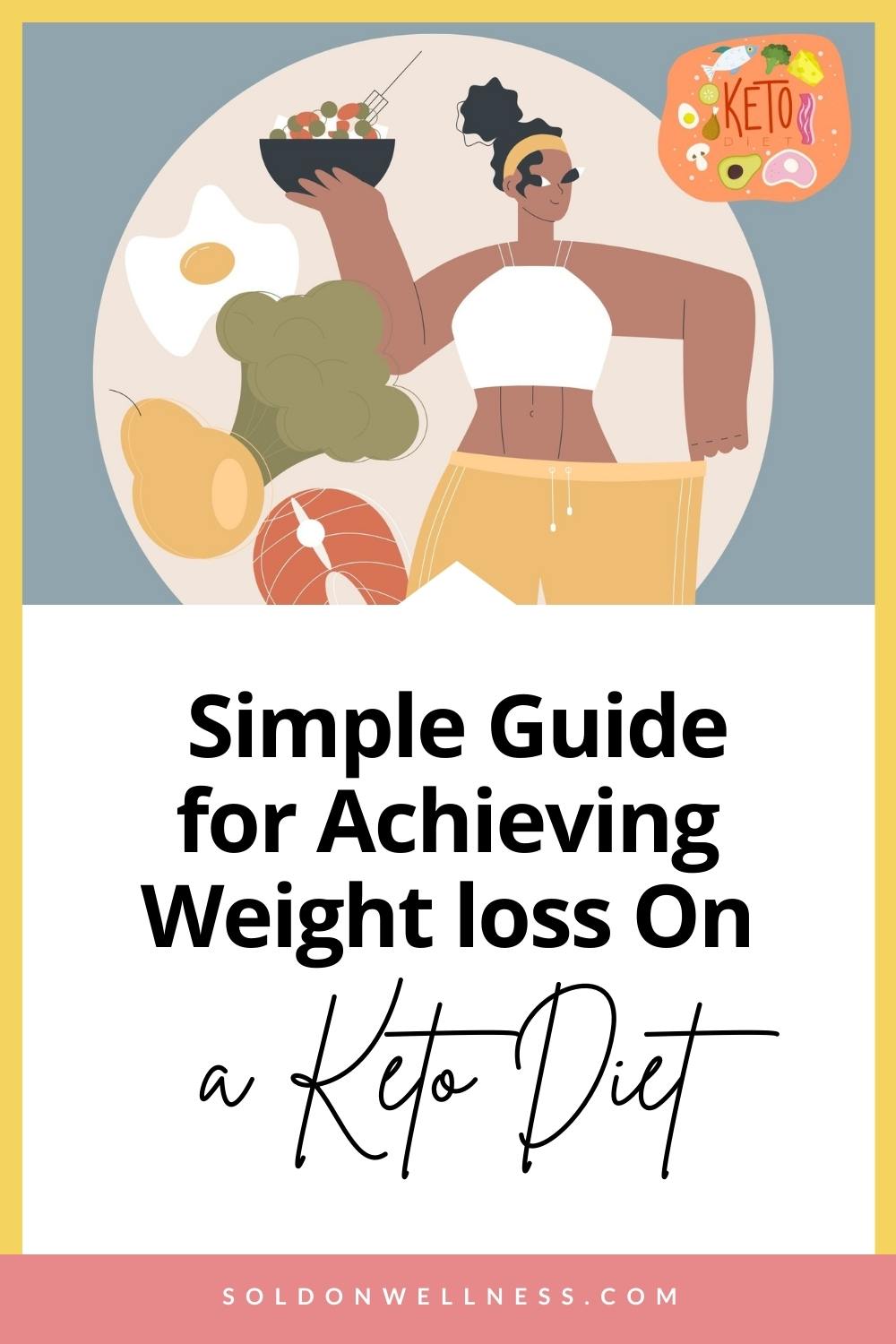Keto diet for weight loss is one of the most popular diets at this time.
The ketogenic diet is a low-carb, high-fat eating plan that has been scientifically proven to help you lose weight and improve your health.
But before we go into the benefits of keto for weight loss, it's important to know what it actually means.
The ketogenic diet (“keto”) is a way of eating where you consume a very limited amount of carbohydrates (usually less than 50 grams per day) while still getting enough protein and fat in your daily intake.
This forces your body to burn fat instead of carbs as its main source of energy.
In this guide, we will go over everything you need to know about the keto diet for weight loss, keto, ketosis and ketogenic diets so that you can make informed decisions about your lifestyle.
1. What is keto and ketosis?

What are ketones?
The ketogenic diet provides an alternative way to produce energy from fat by turning glycogen into ketones in the liver. Ketones can be produced when you consume ketogenic foods like avocados, eggs, meat and some nuts.
This process also helps turn fatty acids or triglycerides into ketones faster than the liver without external hormones. ketones can provide up to 80% of your brain's daily requirement, meaning ketosis has been found helpful when it comes to mental clarity and focus
What is ketosis?
Ketosis is a state in which ketones become the primary energy source for the body, usually due to starvation or prolonged lack of food.
Ketones are chemical structures that result in ketone bodies instead of glycerol, which turns into glucose and blood sugar.
How ketosis can lead to faster weight loss

One of the ketogenic diet's effects is ketosis and ketones. Ketosis can lead to faster weight loss because it suppresses hunger hormones.
Quick ketone results can lead to a feeling of satisfaction, which will help with longer-term weight loss.
Ketosis may also be responsible for keto dieters' ability to break down fat quickly.
Ketosis will allow keto dieters to use ketones as their primary energy source rather than glucose.
Some ketogenic dieters report feeling more satisfied after eating because ketosis has helped them break down their fat quickly.
Researchers are also looking into whether or not ketosis plays a role in keto dieters' ability to burn fat. So, simply put:
- ketosis increases weight loss because ketones make you feel fuller (and thus eat less)
- ketones can provide your body with another form of fuel that is not sugar, which may help to burn fat reserves faster
In other words, when ketones are in ketosis, your body will feel fuller for longer periods of time and also have the ability to use ketones as an alternative energy source.
What you need to know before starting a keto lifestyle

The keto lifestyle is not for everyone, and you must be fully informed before jumping in.
The ketogenic diet primarily consists of fat, protein, vegetables, and nuts/seeds with very little carbohydrates (less than 20% of total calories). This means no bread, pasta or rice.
That means keto-friendly substitutes such as cauliflower rice and zucchini noodles may be used in place of traditional carbs like pasta or potatoes.
When we usually eat carbs, our blood sugar levels will spike so high due to insulin being released into the bloodstream to store the carbs. This will make us feel sluggish and too full.
Keto is a ketogenic diet that can help change all of this by helping you stay fuller for longer without feeling hungry, as ketosis has proven to suppress hunger hormones like ghrelin.
Some people swear by the keto lifestyle because it helped them lose weight quickly - sometimes within days.
Ketosis can help with weight loss by suppressing hunger hormones and turning fat into ketones - a form of energy for the body that doesn't come from sugar, but rather dietary fats or triglycerides.
Ketogenic dieters report feeling more satisfied after they eat because ketosis has helped them break down their fat quickly, which means it's less likely keto dieters will overeat.
Keto, ketosis and ketones all mean that you're essentially burning fat for fuel instead of carbs or glucose from sugar found in food like breads or pasta - which spikes your blood sugar levels so high they can start to feel sluggish or too full.
In ketosis, your body will feel fuller for longer and ketones can act as an alternative energy source to sugar.
For some people keto is easy - they feel full and satisfied on ketogenic diets. For others, keto can be more challenging because it's a lifestyle change.
The keto diet is also not for everyone - people who have type II diabetes or are dealing with kidney stones should avoid ketosis as the ketones may make it worse.
Benefits of keto for weight loss

Keto diet for weight loss ketogenic diets are popular because of the many benefits they offer, including:
1. Increased energy levels
When on a keto diet for weight loss, ketones replace glucose as the body’s primary energy source.
Ketones are a more efficient fuel, and because keto diets for weight loss typically provide fewer carbs to power your day-to-day activities than other diets, ketone production speeds up.
This is why many ketogenic dieters experience rapid weight loss during their first week. keto diet for weight loss
2. Improved mental clarity
Ketones are also a superior fuel for the brain, providing up to nine times more energy than glucose.
The ketogenic diet has been shown in some cases to reverse and prevent Alzheimer’s disease symptoms. keto diet for weight loss
3. Clearer skin
A keto-based diet for weight loss can also help clear up acne.
4. Improved joint and bone health
ketones are the preferred fuel source of our joints, supplying about 50% more energy than glucose does.
Ketogenic diets have been shown to improve arthritis symptoms and slow down or prevent osteoporosis in people with an inherent risk of developing osteoporosis. keto diet for weight loss
And more ketogenic diets have been shown in some studies to help with bipolar, depression, and even serious neurological conditions like epilepsy and Parkinson’s disease.
5. Quicker fat burning
Because keto diets for weight loss provide ketones as a fuel source, the body burns fat more efficiently.
Lower blood sugar and insulin levels: keto diets are also effective for reducing blood sugar and insulin spikes, which can help keep ketones stable.
Ketogenic dieters have lower fasting glucose levels because they’ve entered into ketosis.
6. Easier weight maintenance
With keto-based foods full of fat but low in carbs, people on ketogenic diets for weight loss are less likely to experience hunger pangs and sugar cravings that often lead them to fall off track.
7. Fewer cravings
Keto diets for weight loss are also helpful in curbing cravings, especially when ketones become the primary fuel source.
Ketogenic dieters tend to have a reduced appetite and eat less overall because they’re getting all of their energy from ketones instead of calories that come primarily from carbs.

What are the risks of a Keto diet for weight loss?
The risks associated with the keto diet for weight loss are similar to the keto diet risks.
- The ketogenic diet can cause ketones in urine, which could be a sign of kidney stones or other underlying health conditions.
- One possible risk is that individuals on the keto diet may consume too much protein, which might lead to liver damage over time.
- Another possibility is increased cholesterol levels due to the ketogenic diet.
- The ketogenic diet is not recommended for pregnant women or breastfeeding mothers.
- Those with a history of severe mental illness may also experience adverse side effects on keto diets.
- Individuals who have suffered from eating disorders should avoid keto diets at all costs.
- While the keto diet can cause weight loss, it will be temporary.
- While ketogenic diets may seem healthy, they are not a long-term solution for weight loss or overall health.
- The ketosis resulting from the keto diet can cause dizziness and nausea because of high levels of ketones in the bloodstream (ketonemia). This is especially likely if individuals have an underlying condition in which ketones are not being adequately processed.
- The ketogenic diet may also lead to a worsening of asthma symptoms and has been shown in some cases to make seizures worse for those with epilepsy.
- Some studies have found that ketosis can cause an increase in heart rate, sometimes up as high as ten per cent compared to the normal resting heart rate.
- The ketogenic diet has also been shown to cause a decrease in growth hormone levels, which could cause stunted growth and delays for children following the keto diet.
- If you are on any medication or have an underlying medical condition that cannot be treated with ketosis, then please discuss this before starting keto diets for weight loss.
How to know if the keto diet is right for you

A ketogenic diet isn't for everyone. It may be a good fit for you, but your medical condition and personal beliefs most likely determine this.
If you have diabetic ketoacidosis — ketones build up in the blood due to starvation or lack of insulin — it's best not to try keto as your glucose levels are at dangerously high levels.
Able to tolerate ketosis: A ketogenic diet requires regular consumption of fats sufficient in calories, so if there's an inability to tolerate fat, this might mean that going on a keto diet would be difficult. A doctor could determine if their patient can tolerate ketosis based on lab tests. But usually, a person knows deep down inside whether or not keto is for them.
A ketogenic diet can be a good option for people with type II diabetes. Still, it should only be used under doctor supervision because of the risk of diabetic ketoacidosis and malnutrition if taken off too quickly.
Deeper Dive:
Keto Slow Cooker Recipes: 70+ Delicious Recipes You Will Enjoy
How to enjoy Keto Diet even with Limited Options
55 Keto breakfast Recipes Moms are Loving.
13 Ways to be Successful on a Keto Diet
Easy Keto friendly Egg Roll in a Bowl
Final Thoughts on the keto diet for weight loss

If you’ve been considering trying the ketogenic diet, we hope this article has helped clarify what it means, the benefits and risks associated with it and how to get started once you have decided it's a good fit for your weight loss needs.
MORE RESOURCES:
https://www.hsph.harvard.edu/nutritionsource




